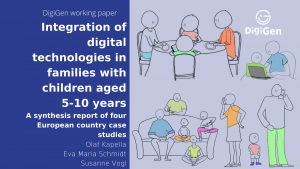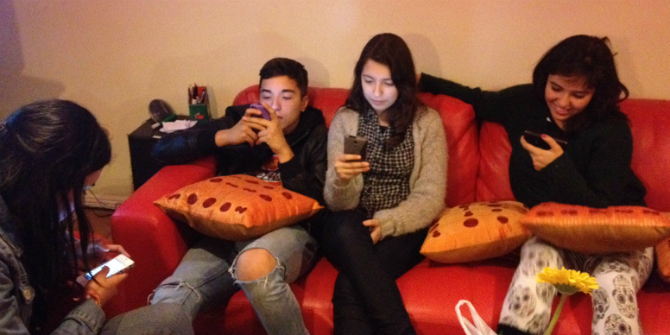 Most European children today are living in media-rich households with access to a variety of different devices. Yet, there is a great variance in how families use technologies and integrate them within their everyday lives and routines. In this blog, Olaf Kapella, Eva Maria Schmidt, and Susanne Vogl discuss their research with families with young children (aged 5-10 years) from Austria, Estonia, Norway and Romania, exploring how technological transformations are affecting family life across Europe.
Most European children today are living in media-rich households with access to a variety of different devices. Yet, there is a great variance in how families use technologies and integrate them within their everyday lives and routines. In this blog, Olaf Kapella, Eva Maria Schmidt, and Susanne Vogl discuss their research with families with young children (aged 5-10 years) from Austria, Estonia, Norway and Romania, exploring how technological transformations are affecting family life across Europe.
How do digital technologies contribute to ‘doing family’?
This study uses the idea of ‘doing family’ to provide a lens to examine how family is produced and exhibited through common practices. Digital technologies contribute to ‘doing family’ through creating and maintaining a sense of ‘we-ness’ and shared identity within the family. This is seen through the roles that different family members take, what they use digital technologies for, and how they mediate or do not mediate their use. As with many other aspects of social development, parents frequently act as role models for their children’s digital technology use. Additionally, in contrast to the offline world, children, as digital natives, are increasingly responsible for teaching and guiding their elders. This shift recognises that different generations have something to contribute to creating a resilient family unit.
In the popular discourse, it is common to hear that digital technologies are reducing the quality and quantity of family time and degrading our ability to function in the social world. In fact, this research discusses how digital technologies play a role in maintaining family wellbeing through different forms of care: caring about, caring for, care-giving, care-receiving, and caring with. For example, staying in touch with family members during lockdowns by video call or message is a form of care, sitting next to your child whilst they play a game on a tablet is a form of care.
How are parents attempting to mediate their children’s use of digital technologies?
Understanding how to parent ‘good enough’ in the digital era is tricky since parents cannot draw on their own childhood experiences in the same way that they would do with other areas of parenting. Parents are having to improvise their way through without necessarily having the support or digital competences themselves to feel confident in their approaches.
Parents across Europe are feeling the pressure of having to mediate their children’s digital technology use, this is partly prompted by discussions of screentime addiction etc which are prominent in the media discourse. Mediating strategies are important for ensuring that children feel supported and guided but too strict rules or lack of access can also make them more vulnerable. Digital technologies are not the bad guy; our research shows that developing strong digital competences can also reduce vulnerabilities.
What are the four main recommendations?
- Build and improve children’s digital competences from an early age onward to ensure their well-being and to avoid increasing and creating (new) vulnerabilities of children.
- Promote digital technologies as one way to support ‘doing family’ in everyday family life.
- Support all children in having access to the digital world to ensure children’s rights.
- Research young children through participatory and multiple-perspective approaches.
Read the full paper for more detail on these recommendations and the research findings here.
This text was originally published on the DigiGen blog and has been re-posted with permission.
This post represents the views of the authors and not the position of the Parenting for a Digital Future blog, nor of the London School of Economics and Political Science.
Featured image: photo by Liliana Drew on Pexels





